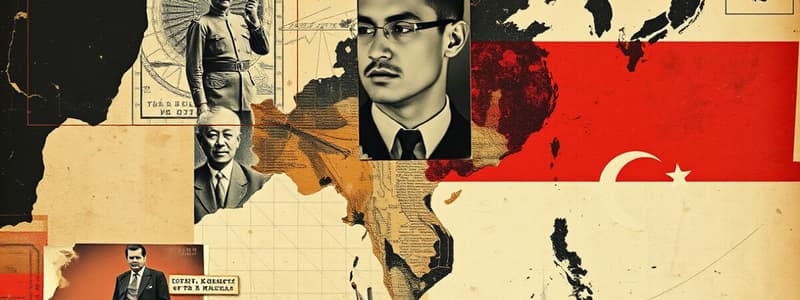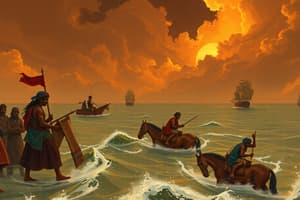Podcast
Questions and Answers
What was one of the main differences between old and new imperialism?
What was one of the main differences between old and new imperialism?
- Old imperialism focused on spreading democracy.
- Old imperialism aimed for cultural assimilation of the populations.
- New imperialism emphasized the extraction of raw materials. (correct)
- New imperialism depended on local alliances for control.
What tactic did the British East India Company use to establish control over India?
What tactic did the British East India Company use to establish control over India?
- Using divide-and-conquer strategies. (correct)
- Negotiating treaties with regional leaders.
- Establishing a welfare state for locals.
- Promoting local businesses to gain trust.
Which event marked the expansion of British direct control in India following the Battle of Plassey?
Which event marked the expansion of British direct control in India following the Battle of Plassey?
- Purchase of the British East India Company.
- Formation of the Raj.
- Introduction of the Enfield Rifles.
- Direct control over Bengal. (correct)
How did British policies during the Raj affect the Indian economy?
How did British policies during the Raj affect the Indian economy?
What sparked the Indian Rebellion of 1857?
What sparked the Indian Rebellion of 1857?
Which of the following describes a protectorate in the context of imperialism?
Which of the following describes a protectorate in the context of imperialism?
What was a significant consequence of British educational reforms during the Raj?
What was a significant consequence of British educational reforms during the Raj?
What characterized the form of imperialism known as spheres of influence?
What characterized the form of imperialism known as spheres of influence?
Which motive was often used to justify imperialism during the 19th century?
Which motive was often used to justify imperialism during the 19th century?
Which method of imperialism involved the imposition of unequal treaties?
Which method of imperialism involved the imposition of unequal treaties?
What was a significant outcome of the Taiping Rebellion?
What was a significant outcome of the Taiping Rebellion?
Which treaty ended the First Opium War?
Which treaty ended the First Opium War?
What major reform did Emperor Meiji implement in Japan?
What major reform did Emperor Meiji implement in Japan?
What did the Open Door Policy allow in China?
What did the Open Door Policy allow in China?
What was a primary goal of the New Culture Movement in China?
What was a primary goal of the New Culture Movement in China?
Which statement best describes the role of the Kuomintang during the Republic of China?
Which statement best describes the role of the Kuomintang during the Republic of China?
What event marked a significant turning point for Japan’s modernization efforts?
What event marked a significant turning point for Japan’s modernization efforts?
What characterized the Era of Humiliation in China?
What characterized the Era of Humiliation in China?
What was the primary aim of the Self-Strengthening Movement in Qing China?
What was the primary aim of the Self-Strengthening Movement in Qing China?
What was the primary outcome of the Second Opium War?
What was the primary outcome of the Second Opium War?
Which of the following best describes a consequence of British imperial policies in India?
Which of the following best describes a consequence of British imperial policies in India?
Which movement called for India's independence from British rule?
Which movement called for India's independence from British rule?
What was a key characteristic of Japan's military reforms during the Meiji Period?
What was a key characteristic of Japan's military reforms during the Meiji Period?
What was a central theme of nationalism in response to Western imperialism?
What was a central theme of nationalism in response to Western imperialism?
Flashcards are hidden until you start studying
Study Notes
Imperialism: An Introduction
- Imperialism involves dominating the economic, political, or cultural life of another entity, often to exploit resources and subjugate populations.
- Old Imperialism (15-18th centuries) focused on mercantilism, emphasizing resource extraction and trade in precious metals.
- New Imperialism (19th-20th centuries), driven by the Industrial Revolution, prioritized raw materials and overseas markets.
Motives of Imperialism
- Expand industrial production via controlled supply of raw materials and investment in colonies.
- Humanitarian justifications arose from a sense of racial superiority among European powers.
- Spread Christianity as part of cultural imperialism in non-Christian regions.
- National prestige and unity motivated powers to display strength on the global stage.
Methods of Implementation
- Short-term: Gunboat diplomacy and military interventions to assert control.
- Medium-term: Imposition of unequal treaties and puppet governments.
- Long-term: Investment in local industries with foreign control, enforcing Western education, languages, and traditions.
Forms of Control
- Colonies: Direct rule by foreign powers with imposition of foreign laws.
- Protectorates: Local governance under foreign security directives.
- Concessions: Territories under foreign economic control while maintaining nominal local governance.
- Spheres of influence: Regions where foreign powers hold significant interest, requiring their involvement in local policies.
India and the British Raj
- The Mughal Empire’s decline led to fragmentation and weakened governance in India.
- British East India Company, established in 1600, gained control through alliances and military superiority, particularly post-Battle of Plassey (1757).
- Economic policies favored cash crop cultivation, resulting in famines like the Bengal famine (1777).
The Indian Rebellion (1857)
- Sepoys, Indian soldiers hired by the BEIC, sparked discontent due to pay disparities and maltreatment.
- Rumors regarding Enfield Rifles led to widespread rebellion, ultimately crushed by British forces who then established the British Raj.
British Raj (1858-1947)
- The British Crown instituted centralized governance with viceroys and legislative councils.
- While the Indian economy grew, it heavily favored British interests, dismantling local industries and exacerbating famines due to cash crop emphasis.
- Nationalist movements gained momentum, notably with the formation of the Indian National Congress (1885) and the Muslim League (1906).
- British responses included oppressive laws (Rowlatt Act, 1919) and violent incidents (Jallianwala Bagh massacre).
China and the Era of Humiliation
- The Qing dynasty faced decline due to mismanagement and local unrest.
- The British engaged China in opium trade, leading to addiction and subsequent conflicts (First Opium War, 1839-1842).
- The Treaty of Nanjing (1842) forced concessions from China, followed by severe internal strife including the Taiping Rebellion (1850-1864).
- The Second Opium War (1856-1860) and the subsequent Boxer Rebellion (1899-1901) further exemplified foreign intervention and Qing vulnerability.
The Republic of China (1912-1927)
- Attempts at reform under Emperor Guangxu culminated in unsuccessful bureaucratic changes.
- Sun Yat-sen led the Kuomintang in the Xinhai Revolution, advocating for democracy and nationalism.
- Following World War I, resentment led to the May Fourth Movement (1919) aimed at national rejuvenation.
- The Chinese Communist Party emerged as a formidable force, resulting in escalating tensions and civil war with the KMT.
Japan and the Meiji Restoration
- Tokugawa Japan's isolationism led to economic stagnation until Commodore Perry's arrival prompted reform.
- Meiji Restoration began with the Charter Oath, focusing on industrialization and Westernization.
- The Meiji Constitution (1889) created a constitutional monarchy with modern legal and educational systems.
- Military reforms incorporated Western techniques, leading to Japan’s victories over China and Russia, and territorial expansion.
Nationalism: A Refresher/Synthesis
- Nationalism emerged as a reaction against Western imperialism, inspiring cultural revivals and calls for self-determination.
- Economic exploitation and military conflicts fostered anti-imperialist sentiments.
- The rise of a politically aware middle class facilitated a push for national identity and mass mobilization against colonial powers.
- Educational exposure to liberal and nationalist ideas contributed significantly to the nationalist movements across colonized regions.
Studying That Suits You
Use AI to generate personalized quizzes and flashcards to suit your learning preferences.




